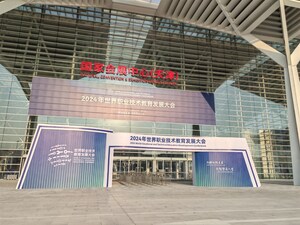Specialists see innovation, digital tech as key to South-South cooperation
Speakers stress structural solutions can overcome problems, promote development
BEIJING, Nov. 21, 2022 /PRNewswire/ -- The advent of the digital era has established beyond any doubt the symbiotic relationship between science, technology and innovation on the one side and social and economic growth on the other — something that the key report delivered to the 20th National Congress of the Communist Party of China highlighted, while urging more efforts toward Chinese modernization. To imbibe the spirit of that philosophy enshrined in the report, China Daily, in association with the University of Oxford, organized an online forum on Friday. The following special report encapsulates key insights on the theme shared by experts during the forum.
Technological innovation and the application of emerging digital technologies are playing an increasingly important role in promoting South-South cooperation, boosting the governance capacities of developing countries and creating greater synergy in their development, speakers said at an online forum on Friday.
Qu Yingpu, publisher and editor-in-chief of China Daily, highlighted that scientific innovation and the application of new technologies serve as a structural solution to the problems confronting the Global South in its development.
A report delivered to the 20th National Congress of the Communist Party of China stressed the need to "regard science and technology as our primary productive force, talent as our primary resource and innovation as our primary driver of growth".
Noting that China attaches great importance to scientific and technological development and international cooperation, Qu said, "Over the past decade, the contribution of science and technology to China's economic growth has increased remarkably, which has paved a solid foundation for the country to advance Chinese modernization."
He also said the Chinese path to modernization provides an alternative way for countries to achieve rapid development while preserving their independence.
"China is committed to be a builder of world peace, a contributor to global development and a defender of the international order. It is also a key participant of, and a contributor to, global development cooperation. From a global strategic perspective, stronger South-South cooperation will help promote democracy in international relations," Qu said.
Hosted by the China Watch Institute of China Daily and the Technology and Management Center for Development, which is part of the University of Oxford, the forum themed "South-South Cooperation in Science, Technology and Innovation" was held online on Friday.
Qu said the purpose of holding this forum is to share the experience of sustainable development and build consensus for promoting South-South cooperation, thus contributing to the building of a community with a shared future for mankind.
He called for efforts to enhance South-North cooperation and deepen South-South cooperation, and align the Global Development Initiative with the existing development and cooperation strategies of participating countries to generate greater synergy in global development.
Fu Xiaolan, fellow of the British Academy of Social Sciences, and professor and director of the Technology and Management Center for Development at the University of Oxford, said that innovation is an important driver of long-term economic growth and sustainable development, and emphasized the significance of international cooperation in science, technology and innovation.
"The rise of the innovation capabilities in the Global South, especially the emerging economies, has provided a very important addition and alternative for the other developing countries in terms of technology transfer and innovation collaboration," Fu said.
Fu further said that findings from a case study of Chinese tech heavyweight Tencent suggested the changes in the value of a firm from "managing people" to "serving people" play a very important role in motivating and empowering people for better innovation.
It is clear that digital technologies will transform lives and livelihoods by fundamentally and irrevocably changing how people, businesses and governments interact, said Sonia Bashir Kabir, vice co-chair of the Council of United Nations Technology Bank for Least Developed Countries.
She said the shocks of the COVID-19 pandemic exposed the weaknesses of existing systems, and countries with stronger digital infrastructure were able to mount faster, more effective responses.
With the blossoming of 5G, big data, artificial intelligence and other innovative digital technologies, the digital economy is gradually becoming the integral driving force for economic growth. According to a white paper released by the China Academy of Information and Communications Technology, the scale of China's digital economy reached 45.5 trillion yuan ($6.39 trillion) in 2021, accounting for 39.8 percent of the country's GDP.
The countries of the South have contributed more than half of the world's growth in recent years. Intra-South trade is higher than ever, accounting for more than a quarter of all world trade, according to the United Nations.
Zhou Taidong, associate research fellow of the Development Research Center of the State Council, said digital technological innovation is injecting unprecedented momentum into the global economy and is propelling the economy and society toward a more intelligent and smarter era.
Zhou noted that strengthening cooperation in digital technology and intelligent science and technology among developing countries is becoming increasingly important and should be a key area of South-South cooperation in the future.
Zhou's views were echoed by Nobuya Haraguchi, chief of the Industrial Policy Research Unit at the United Nations Industrial Development Organization, who said advanced digital technologies are driving industrial growth across countries, and digitalization is also supporting industrial firms' resilience during the pandemic.
"The innovation of digital technologies and digital economy provide a vast space for international cooperation, especially among developing countries," said Cheng Hua, executive director of the Center for Digital Economy Research at the Renmin University of China in Beijing, adding promoting international cooperation through platform innovation requires good regulatory coordination among countries and clear regulations that are inclusive and prudent.
By FAN FEIFEI






Share this article